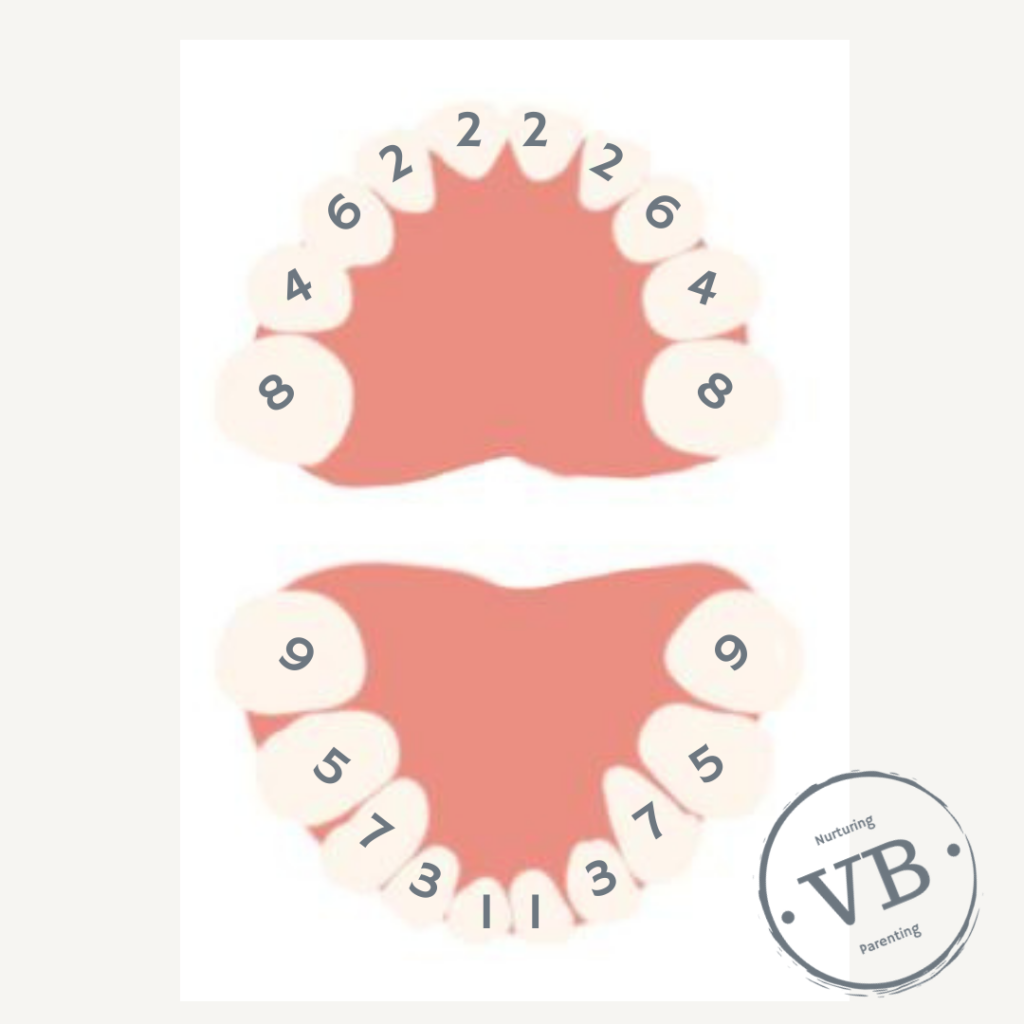
Everything about teething

Every baby reacts differently to the teething. Some babies are more affected than others. But when will the teeth come through and how can you relieve the pain? What can you do if this makes it harder for your little one to sleep?
Teething not only leads to physical discomfort, but it can also disrupt your little one’s sleep rhythm.
When will your baby’s teeth come through?
The first teeth start to grow at the beginning of pregnancy. Your baby’s milk teeth are formed under the gums. However, the first teeth will not really come through months after birth. The first two teeth that are really visible are usually the two middle teeth in the lower jaw. These last between 4 and 7 months. This does not mean that they have to come through, but the average is around 6 months. Until about the age of 3 years, the teeth sporadically come through until they have their entire deciduous teeth together.

1
Between 4 and 7 months
2
Between 8 and 16 months
3
Between 9 and 16 months
4 & 5
Between 13 and 19 months
6 & 7
Between 16 and 22 months
8 & 9
Between 20 and 33 months
Symptoms of teething
Teething is often associated with discomfort. It puts a lot of pressure on the gums. This can cause pain and physical discomfort. It differs per baby which complaints and the duration of the complaints he experiences. The most common symptoms are:
- Drooling
- Crying and Fuzzy
- Swollen gums
- Restless sleep
- Refuse to eat
Once a tooth has broken through, these complaints often disappear quickly. With the next tooth, the complaints will return.
Diarrhea or fever have nothing to do with teeth coming through. If your baby has one if these signals, he is probably sick. We therefore recommend that you approach your doctor for this.
What to do during teething
You cannot prevent the discomfort of teeth coming through for your little one, but you can help reduce the complaints. The tips & tricks below can help you with this:
Give your baby something to bite on
If your baby bites on something, it creates counter pressure. This reduces the painful pressure from teeth coming through. You can buy a special teether for this. A cool teether is extra nice. You keep these in the fridge. The cooling soothes the pain.
Massage the gums
Gently rub the gums with your finger. Of course, wash your hands first! It is also possible to use the oil from Villa Bimbi for this. Send us a message for more information.
Give your baby something cool to drink or eat
Think of a little yogurt or cold water. This cools the gums and thus relieves pain. Only give chilled food and drinks that your baby is ready for based on his age.
Extra love and attention
What always helps is: love! Give extra attention, hugs and kisses if you notice that your little one is not feeling well. You will also find that your little one needs you more close. Listen to your instinct. It is only good to give them the extra closeness and love they need right now.
Use a salve
The chemist and pharmacy sell salves against discomfort caused by teeth coming through. A lidocaine gel, for example, has a local analgesic effect. You apply this to the painful jaw with a cotton cloth. Read the package leaflet carefully before use.
Teething and sleeping
Because your little one experiences physical discomfort with teeth coming through, this is often accompanied by a disturbed sleep rhythm. As mentioned above, you often see that the little ones need you more close. It may be that your little one has started refusing his naps and feedings and wakes up often during the night.
The best thing to do is try to stick to the current schedule as much as possible, while still offering him the closeness he needs. The more you stick to the schedule, the easier it will be for him to get through it and not have any sleep problems afterward.
However, if you see that your little one has started to refuse the feedings, you can offer them in smaller quantities throughout the day. Nutrition has a major influence on the sleeping behavior of a child, so it is therefore important that your little one gets enough intake.
If your little one refuses to sleep during the day, you can use a plan B (sleeping on Mum or Dad’s chest, in the stroller or in the car; something you know makes sleeping easier). Ultimately, we want to prevent your little one from becoming overtired. Because that keeps the sleeping problems going.

